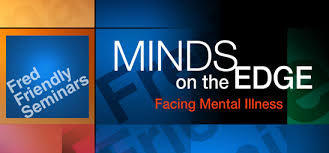Watch this short clip from Minds on the Edge
(3-29-19) FROM MY FILES FRIDAY: Shortly after my book, CRAZY: A Father’s Search Through America’s Mental Health Madness, was published, I was asked to participate in a PBS special program about involuntary commitment.
It used a scenario inspired by what had happened to my son and me after we were refused treatment at a hospital emergency room and he ended up breaking into a stranger’s house to take a bubble bath.
MINDS ON THE EDGE proved to be compelling television, so much so, that many local mental health groups began using it to discuss the “danger to self and others” standard.
I wrote this blog in 2010 about how one NAMI chapter had cleverly modified the show.
MINDS ON THE EDGE: Pete Earley Confronts Pete Earley
(2010) A funny thing happened recently. A man approached me after I delivered a speech and said: “Hi, I’m Pete Earley.”
I wasn’t certain what he was talking about until he explained that his local mental health group had used Minds on the Edge to discuss involuntary commitment. Members in his group had played the roles of those of us who actually were in the Fred Friendly Seminars broadcast.
He had been me — an angry and frustrated parent who couldn’t get help after his son became psychotic.
Because my “double” was familiar with conditions in his local community, he was able to tailor his comments to what actually happened in his own neighborhood when someone had a psychotic break. That made the issues surrounding commitment germane to him and local officials, and helped both see holes in the system.
I’d encourage you to watch Minds on the Edge . It affords you the opportunity to see and hear how a Nobel Prize laureate, a U.S. Supreme Court Justice, an ethicist, the father of Housing First, Author Elyn Saks, Judge Steven Liefman, Dr. Fred Frese, Dr. Tracey Skale, and other top mental health advocates grapple with a fictional scenario that remains all too familiar for many of us.
The program won awards from the National Alliance on Mental Illness and Mental Health America, and I doubt the discussion that it spotlights will be resolved anytime soon.




